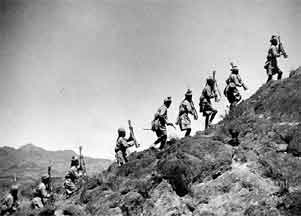1904 British Reach Tibet
The British sent a military force into Tibet, encountering significant opposition along the way. Once British forces reached the Tibetan capital of Lhasa, the Tibetans were conciliatory and rapidly agreed to British terms. The two sides signed the Lhasa Convention, on September 7, 1904
In an effort to establish trade relations and expand their influence in the region, Great Britain pressured Tibet into negotiating a series of commercial agreements. To achieve this objective, the British deployed a military force, led by Sir Francis Younghusband, to enter Tibet in 1903-1904, they faced considerable resistance during their expedition.
As the British troops advanced towards the Tibetan capital of Lhasa, they encountered significant opposition from the local population and military forces. Despite the challenges, the British forces managed to reach Lhasa, which dramatically altered the Tibetans' stance towards negotiations.
Upon the arrival of British forces in Lhasa, the Tibetan leadership adopted a conciliatory approach, swiftly agreeing to the terms proposed by the British, with one notable exception - they refused to cede any of their territory. This demonstrated the Tibetans' desire to maintain their territorial integrity while accommodating the demands of a powerful foreign nation.
The outcome of this expedition was the signing of the Anglo-Tibetan Treaty, also known as the Lhasa Convention, on September 7, 1904. This treaty allowed for increased trade and diplomatic relations between British India and Tibet.
 >
>